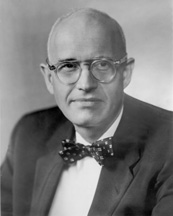Richard L. Neuberger
| Richard L. Neuberger | |
|---|---|
 |
|
|
United States Senator from Oregon |
|
|
In office January 3, 1955 – March 9, 1960 |
|
| Preceded by | Guy Cordon |
| Succeeded by | Hall S. Lusk |
| Member of the Oregon House of Representatives | |
|
In office 1941–1942 |
|
| Constituency | Multnomah County |
| Personal details | |
| Born |
Richard Lewis Neuberger December 26, 1912 Multnomah County, Oregon |
| Died | March 9, 1960 (aged 47) Portland, Oregon |
| Political party | Democratic |
| Spouse(s) | Maurine Brown (1945-1960; his death) |
| Profession | Journalist |
| Religion | Judaism |
Richard Lewis Neuberger (December 26, 1912 – March 9, 1960) was an American journalist, author, and politician during the middle of the 20th century. A native of Oregon, he wrote for The New York Times before and after a stint in the U.S. Army during World War II. A Democrat, he entered politics in his home state by winning a seat in the Oregon House of Representatives and later was elected to the United States Senate. His widow, Maurine Brown Neuberger, won his Senate seat after his death.
Neuberger was born on December 26, 1912, in the rural part of Multnomah County, Oregon, the son of Ruth (Lewis) and Isaac Neuberger, restaurant owners. His grandparents were all German Jewish immigrants. Neuberger grew up in nearby Portland. He graduated from the University of Oregon in 1935, and served as editor of the student newspaper, the Oregon Daily Emerald. Neuberger began writing for The New York Times as a college senior, and became the newspaper's Northwest correspondent in 1939. He also began writing books during these years.
In 1940, Neuberger was elected to the Oregon House of Representatives. His political career was interrupted by World War II, during which Neuberger served in the U.S. Army as an officer from 1942 to 1945. Back in civilian life, Neuberger continued to work for the Times and write books, and was elected to the Oregon State Senate in 1948, after losing in 1946. Neuberger and State Senator and future Governor Robert Holmes were two of the leading liberals in the Oregon legislature at a time of Republican dominance. During the 1949 legislative session, Democrats succeeded in forcing a vote in favor of one of the nation's first fair employment practices laws, though watered down by the Republican majority.
...
Wikipedia
